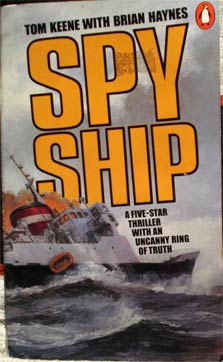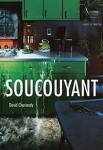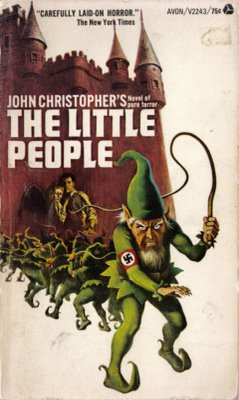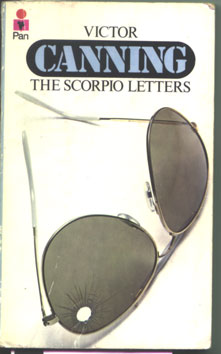 I picked this book up from the same street vendor in Toronto who sold me Scapa Ferry and I really hemmed and hawed over it. On the one hand, the cover looked cool, just from the period I like (the height of Desmond Bagley's popularity). On the other, it takes place in the cold war and seemed to have a lot of military and espionage themes, which I am not so interested in (I don't mind the period, but I like the focus to be on adventure). Also, I was worried the whole thing would take place aboard some military ship. After reading it, I'm glad to say I made the right choice. Yes, the story is definitely in the context of the cold war, but the ship is sunk right at the beginning (it is the catalyst that starts the story) and the bulk of the narrative is about a plucky young reporter (whose father died on the ship) trying to find out what happened.
I picked this book up from the same street vendor in Toronto who sold me Scapa Ferry and I really hemmed and hawed over it. On the one hand, the cover looked cool, just from the period I like (the height of Desmond Bagley's popularity). On the other, it takes place in the cold war and seemed to have a lot of military and espionage themes, which I am not so interested in (I don't mind the period, but I like the focus to be on adventure). Also, I was worried the whole thing would take place aboard some military ship. After reading it, I'm glad to say I made the right choice. Yes, the story is definitely in the context of the cold war, but the ship is sunk right at the beginning (it is the catalyst that starts the story) and the bulk of the narrative is about a plucky young reporter (whose father died on the ship) trying to find out what happened.The story is based on the intelligence war that took place in the North Sea between the Russians and the west. Along the frontier off the shores of Norway Russian subs and American and British ships would play games of cat and mouse, each trying to read data off the other. The set-up for spy ship is that the British were secretly putting scanning equipment aboard long-range commercial fishing vessels, unbeknownst to even most of the crew, thus putting them in danger. When one of them gets blown up, the government has to cover it up.
There's lots of cool stuff in this book. The aristocrats who run the shadier parts of the government and the darker, amoral men who run the even shadier parts under them are the badguys. There is a really scary ex-military guy who has a carte blanche to clean up problems. The fishermen and their world is portrayed vividly and with compassion and there are some great fight scenes. The story itself had some very good twists and the final reveal of what actually happened surprised me. All in all, a pretty good read.
I imagine this was the kind of thriller that was read by businessman on the train on their way to the city when it first came out, but has since faded into obscurity. There even was a British mini-series made of it, which might be worth checking out if it ever shows up again (that's the kind of shit that we should be able to find on late night tv, but no).
 All this classic science fiction reading going on over at
All this classic science fiction reading going on over at  Except for Stepen King, I was never a huge fan of horror. But in recent years, with the influence of Meezly, Fantasia and other friends, I'm getting more and more exposed to it. One of those friends, Jocelyn, whom I met through gaming, is quite into it. He ran a very fun Unknown Armies, (which would some would say is the RPG that epitomizes contemporary horror) campaign that I played in and he lent me Dark Harvest. I have no idea how Norman Partridge came onto his radar, because I've never heard of him before, but if this book is indicative of his skill and style, he's good.
Except for Stepen King, I was never a huge fan of horror. But in recent years, with the influence of Meezly, Fantasia and other friends, I'm getting more and more exposed to it. One of those friends, Jocelyn, whom I met through gaming, is quite into it. He ran a very fun Unknown Armies, (which would some would say is the RPG that epitomizes contemporary horror) campaign that I played in and he lent me Dark Harvest. I have no idea how Norman Partridge came onto his radar, because I've never heard of him before, but if this book is indicative of his skill and style, he's good. I have to admit that I didn't read all of this book in 2008, and in doing so, reveal a little strategy I use to give me a slight boost towards reaching the goal of 50 books a year. I don't like buying books of short stories, even if I am a fan of the author, because I can rarely get through them. Every now and then, in the case of great authors (such as Doyle and Howard), I can not resist. My trick is that in between every book that I finish, if I don't immediately go on to another novel, I'll read a short story or two. Eventually, I'll complete the entire collection and get to add it to my list. Such was the case with
I have to admit that I didn't read all of this book in 2008, and in doing so, reveal a little strategy I use to give me a slight boost towards reaching the goal of 50 books a year. I don't like buying books of short stories, even if I am a fan of the author, because I can rarely get through them. Every now and then, in the case of great authors (such as Doyle and Howard), I can not resist. My trick is that in between every book that I finish, if I don't immediately go on to another novel, I'll read a short story or two. Eventually, I'll complete the entire collection and get to add it to my list. Such was the case with  CanLit time people! My boss passed me down this book while we were working together in Vancouver. Normally, I have a hard time reading these kinds of books, but it had a glossy cover and nice large margins, so I figured I could handle it. It's the story of a young black man in Ontario dealing with his mother's dementia. You can see why I might have normally hesitated! Sometimes, though, when someone random lends me a book, I'm quite motivated to read it. Can't explain it, but there it is.
CanLit time people! My boss passed me down this book while we were working together in Vancouver. Normally, I have a hard time reading these kinds of books, but it had a glossy cover and nice large margins, so I figured I could handle it. It's the story of a young black man in Ontario dealing with his mother's dementia. You can see why I might have normally hesitated! Sometimes, though, when someone random lends me a book, I'm quite motivated to read it. Can't explain it, but there it is.  This was sitting on my friend's desk when I was crashing at his secret mountain getaway, nursing a sprained ankle and moping regretfully about the plastering I wasn't able to do. The premise intrigued me. Plus, it was fairly large in print with wide margins, so I knew I could get through it before I left.
This was sitting on my friend's desk when I was crashing at his secret mountain getaway, nursing a sprained ankle and moping regretfully about the plastering I wasn't able to do. The premise intrigued me. Plus, it was fairly large in print with wide margins, so I knew I could get through it before I left. I like Walter Mosley and grab his books when they are cheap (a quarter outside of Pulp Fiction in Vancouver) but I don't follow too closely or remember the exploits of his protagonist, Easy Rawlins.
I like Walter Mosley and grab his books when they are cheap (a quarter outside of Pulp Fiction in Vancouver) but I don't follow too closely or remember the exploits of his protagonist, Easy Rawlins.  I found two more John Christopher books at Pulp Fiction when I was in Vancouver, both first edition hardbacks for $7.95. Now that I think about it, that's actually a pretty good deal, when standard used paperbacks are going for $4.95 these days.
I found two more John Christopher books at Pulp Fiction when I was in Vancouver, both first edition hardbacks for $7.95. Now that I think about it, that's actually a pretty good deal, when standard used paperbacks are going for $4.95 these days. 
 I found a great used bookstore in Vancouver (ABC books on W. Broadway near Granville, right by the bus stop). Whoever is buying books for this place knows their stuff. They had such a good and organized collection that I was drawn to some of the recommended or featured books. There was a stack of paperbacks by Victor Canning, that had cool looking covers, classic '70s and 80s British crime editions from houses like Pan. I grabbed the one with the bullet-holed aviator glasses on the cover and wasn't disappointed.
I found a great used bookstore in Vancouver (ABC books on W. Broadway near Granville, right by the bus stop). Whoever is buying books for this place knows their stuff. They had such a good and organized collection that I was drawn to some of the recommended or featured books. There was a stack of paperbacks by Victor Canning, that had cool looking covers, classic '70s and 80s British crime editions from houses like Pan. I grabbed the one with the bullet-holed aviator glasses on the cover and wasn't disappointed.


